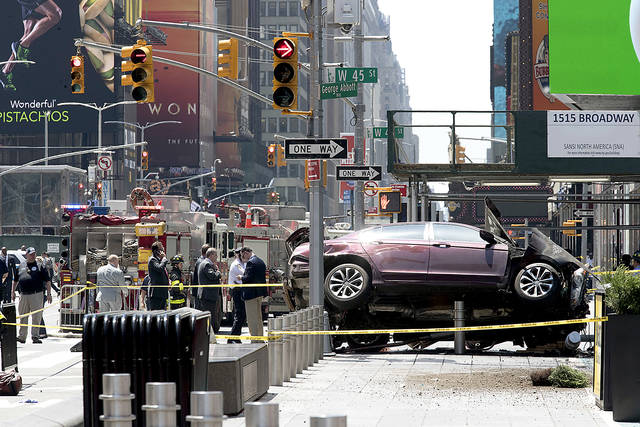NEW YORK — Fears of a terrorist attack prompted officials to ring many of the pedestrian plazas of Times Square with squat steel posts capable of stopping a speeding vehicle. ADVERTISING NEW YORK — Fears of a terrorist attack prompted
NEW YORK — Fears of a terrorist attack prompted officials to ring many of the pedestrian plazas of Times Square with squat steel posts capable of stopping a speeding vehicle.
But those barriers only cover so much ground. There were none of them Thursday at the corner where a man steered his car onto a busy sidewalk and began barreling through crowds of pedestrians, running down 23 people and killing one before one of the metal posts finally stopped him.
The bollard that stopped the car driven by Richard Rojas likely saved lives by preventing it from entering an even more densely packed pedestrian plaza, and some New Yorkers are wondering whether the barriers should be deployed on many more sidewalks.
“We can and should do more to keep our residents and visitors safe on our streets and street design is the first place to start,” said Ydanis Rodriguez, a city councilman from Manhattan who chairs the transportation committee. He called for the installation of more bollards at the ends of city sidewalks in busy areas.
Last year, city officials installed 200 custom-made bollards in the Times Square area, enlisting the California-based Calpipe Security Bollards to manufacture and help design special 8 1/2-inch diameter hunks of metal that are embedded in the ground and spaced about 4 feet apart, said Rob Reiter, the company’s security consultant.
The bollards come equipped with special locks that firefighters can undo so they may be removed in an emergency.
In Times Square, they are embedded no more than 18 inches into the ground, a necessity given the subway station just beneath the city’s surface.
Still, that was enough of an anchor to abruptly stop Rojas’s Honda Accord, which was tossed into the air and wound up on its side.
“You always want to make a vehicle hit two barriers; that way no barrier can fail,” Reiter said. “You have to space for two considerations: vehicle stopping and pedestrian access.”
City officials didn’t say how many bollards have been installed in recent years.




